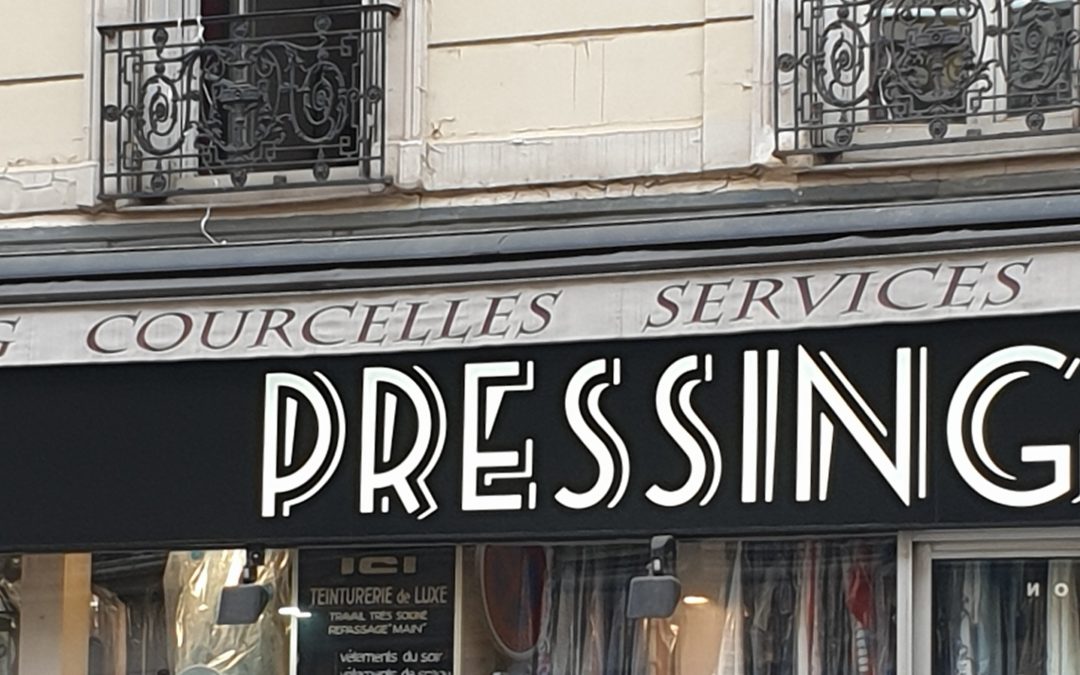By Anne Swardson
I came back to the apartment the other day and said very excitedly to my husband, “I got controlled! But it was OK, I had my attestation.”
He knew exactly what I meant: I had gotten checked by the Paris cops and had the right form on my cell phone to explain why I was outside during the lockdown.

It was a reminder that the coronavirus crisis in France has added some new words to a vocabulary known as Frenglish. It’s a cousin of franglais, but the other way around: French words, or their direct English equivalents, get inserted into English sentences. Native English speakers who have lived here a long time can sound like they are speaking in a strange code.
“The Métro is perturbed.”
Lily Hertling, Takoma Park, Maryland
Sometimes it’s done on purpose, as a kind of self-conscious play on the French word. Charlie and I jokingly ask each other, “How is the circulation today?” when we mean how’s the traffic. Just because it’s funny. Similarly, we might say, does the No. 3 Métro line disserve the Temple stop? For reasons we can’t figure out, to disserve is to serve.
There are some special cases. The sign on this post’s lead image shows an English word, pressing, that has been co-opted to become the French word for dry cleaner’s. But it also counts as Frenglish, as in, “Can you take my clothes to the pressing?”
“Are those eggs bio?”
John Freed, Paris
We transplants – I prefer that term to expatriates or immigrants – adopt these terms for a variety of reasons. They can be more efficient. It’s easier to ask, “Did you find a parking?” than it is to ask if the person found a parking place or a parking garage. Catching the train at the gare seems more natural than at the train station.
Sometimes the Frenglish version is the first word that comes to mind, especially if that’s what you hear all day. “Attestation” comes to the tongue a lot faster than permission slip; “control” is on everyone’s mind these days much more than “police check.” And we say confinement, the French term for the 45-day lockdown, even though we aren’t actually in prison. See here for a list of coronavirus-associated French words.
“I’m not very pressed.”
Madison Olver, Maisons-Laffitte
Bilingual children are particularly susceptible – Whoops! I just wrote one – to Frenglish. Our son Henry would say things like, “I crossed Nico on the street,” when he meant he’d run into his friend. Asked where he got a particular toy, he responded: “It’s the fashion at my school.”
Louise, for her part, announced once that she had to tread lightly with one of her teachers because the woman was very “sensible.” It’s a faux-ami with “sensitive.” The son of a friend, on a family beach vacation, ordered his brother not to block the sunlight because Mom was “bronzing.”
When they go to school, kids carry their trousses, not their pencil cases. And hoist their cartables, which in theory are backpacks but are bigger. Since many schools don’t have lockers they can be quite a load.
“I posed the question.”
Polly Freeman Lyman, Raleigh, North Carolina
The list goes on. We respect the rules rather than obey them, whether pertaining to confinement or not. We look up the rules’ precisions, not their details. Stores that have run out of a particular item, like masks, are in rupture. Striking workers manifest (often) in the street rather than demonstrate. We consult our planning to see if we are free for dinner next week, rather than our calendars. At least we will when we can leave the house again.
I send a virement to pay someone, not a bank transfer. My monthly utility payment is préleved, an anglicization of prélevé (automatic bill payments), from my account. A Muslim woman wears a veil, not a headscarf. Clothing stores serve clients, not customers, or least they will when they are deconfined on May 11. To lure those clients, they will no doubt offer interesting prices. We depose our children at school rather than drop them off (that too will resume on May 11, though no one seems to know yet how it will work.)
“Can you precise your point?”
Rob Davis, L’Etang la Ville
I received an enormous response to my Facebook request for Frenglish examples from current and former residents of France, and I send my thanks to all of them. It’s something that binds us together – and to our second country.
Writing in his 1983 book “The French,” Theodore Zeldin said: “People use foreign words because they feel part of an international community.” He was speaking of franglais, back in the days when English was seen as a real threat to the language of Molière. But I think it applies to Frenglish as well.

Fascinating, as are all your blog posts, Anne.
Your post amused me well!
Interesting, We had a friend (Max Pullen) who, while he was studying French, used to say things like, “Is it that you are going to the store?”
Wonderful! Didn’t know you could put the form on your phone. Thought you had to use a new piece of paper each day. Be well and take care! Patty
Sent from my iPhone
>
So interesting! I am wondering – do you use French or English pronunciation when using Frenglish? And, is your pronunciation different from your bilingual childrens’?
Good questions! My accent is certainly worse than my children’s – they used to snicker when I spoke. As for Frenglish, it kind of depends. If it’s a true French word I think I say it with a French accent, but perhaps a tad lazily.
Belatedly, thank you so much!
I have recently come across two others: “He was only verbalized by the police,” and “the Maire exiged that…”
Ha! Indeed. Real Paris-resident examples, both